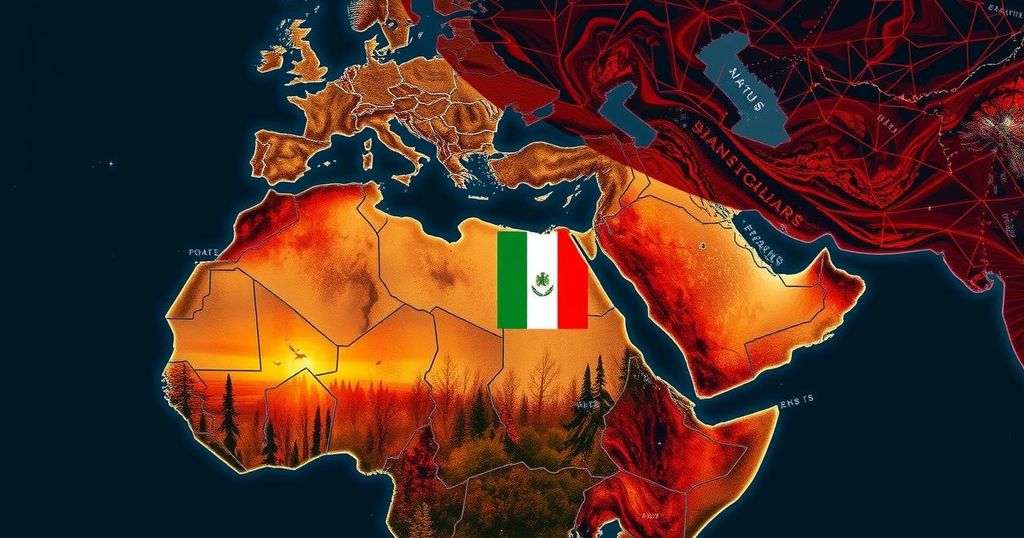Shifting Alliances in the Horn of Africa: The Egypt-Eritrea-Somalia Axis

The recent summit involving Egypt, Eritrea, and Somalia indicates a significant shift in the Horn of Africa’s geopolitics, primarily aimed at encircling Ethiopia amid ongoing tensions related to water rights and territorial disputes. This trilateral relationship emphasizes military cooperation and indicates an evolving power dynamic as Ethiopia’s influence faces challenges from its neighboring states. The summit highlights the implications of these alliances for regional stability and security, necessitating effective diplomatic responses from Ethiopia.
The recent trilateral summit involving Egypt, Eritrea, and Somalia marks a notable shift in the geopolitics of the Horn of Africa, a region characterized by persistent instability, rivalries, and competing national interests. Convened in Asmara, Eritrea, this meeting ostensibly aimed to project unity in the face of regional security challenges. However, it was primarily focused on encircling Ethiopia, whose influence looms large in neighboring territories. The discussions culminated in a commitment to enhance cooperation and promote regional autonomy, yet the underlying tensions with Ethiopia were clearly acknowledged as a central concern. Ethiopia, a significant player in the region, has historically been at the nexus of these power dynamics, particularly concerning its contentious negotiations with Somaliland and the ongoing disputes over the Grand Ethiopian Renaissance Dam with Egypt. This potential maritime deal involving Ethiopia’s acquisition of a Somaliland coastline for naval and commercial operations has amplified tensions with Somalia, which has not recognized Somaliland’s independence since it broke away in 1991. In August, Somalia formalized a military alliance with Egypt, reinforcing its ongoing security cooperation with Cairo, which includes the provision of arms and military support in combating the al-Shabaab insurgency. This alignment appears to indicate a deterioration of Ethiopia’s relations with its neighbors, as the Cairo-Mogadishu partnership gains strength. While Ethiopia was not explicitly mentioned during the summit, the focus on addressing heightened anxieties regarding its activities in the region was evident. Egypt’s rivalry with Ethiopia, especially concerning the Grand Ethiopian Renaissance Dam on the Blue Nile, represents one of the most critical points of contention. Cairo perceives this dam as a vital threat to its water resources, and ongoing negotiations have reached an impasse exacerbated by Ethiopia’s actions. Additionally, Egyptian military support in Somalia is pivotal in Egypt’s strategy to counterbalance Ethiopia’s growing influence. Moreover, Eritrea’s involvement underscores its ambition to assert itself as a regional power, particularly in light of its strategic location near the Bab el-Mandeb Strait, a critical maritime passage. This trilateral cooperation is primarily designed to mitigate the rising dominance of Ethiopia, with Somalia’s dissatisfaction over the Somaliland agreement serving as a catalyst for its partnership with Egypt. The Asmara summit may signal a realignment of power dynamics in the Horn of Africa, as Egypt, Eritrea, and Somalia position themselves for military and regional control in opposition to Ethiopia. The implications of this new alliance remain uncertain, particularly concerning its effect on regional stability. Egypt’s engagement, despite its geographical distance from Somalia, raises significant concerns. The joint declaration regarding the quest for “peace in the region” cannot overshadow the deeper strategic tensions, particularly in light of Egypt’s historical frustrations surrounding the Nile waters and its potential willingness to leverage Eritrea as a proxy in any forthcoming conflicts with Ethiopia. This coalition heightens apprehensions regarding Ethiopia’s security amidst threats from Somali extremist factions targeting its interests. Consequently, Ethiopia must navigate its diplomatic strategies adeptly, fostering relationships with international entities while also solidifying partnerships with neighboring countries such as Kenya and Sudan, which may serve as a counterweight to this evolving alliance. Exploring frameworks for the equitable management of Nile waters is essential in defusing tensions, but concurrently, Ethiopia must engage in proactive public diplomacy to elucidate its intentions and ambitions within this fragile regional context. The manner in which Ethiopia addresses these shifting alliances will be crucial in determining its long-term security and stability in the Horn of Africa.
The Horn of Africa is a geopolitically sensitive area, as it has long been marked by instability and complex interrelations among its nations, particularly Ethiopia, Egypt, Somalia, and Eritrea. Ethiopia, the dominant regional player, has been involved in disputes, notably regarding the Grand Ethiopian Renaissance Dam and the country’s relationships with its neighbors, which are often fraught with tension. The recent alliance among Egypt, Eritrea, and Somalia reflects a strategic maneuver to counterbalance Ethiopia’s influence and reveals the shifting nature of regional alliances as nations seek to establish military and economic security in a volatile environment.
In conclusion, the recent summit involving Egypt, Eritrea, and Somalia represents a significant transformation in the alliances within the Horn of Africa. While the partnership aims to bolster regional security and autonomy, it simultaneously encircles Ethiopia amidst ongoing tensions surrounding water rights and territorial disputes. As Ethiopia grapples with these challenges, its capacity for diplomatic engagement and strategic alliances with neighboring states will be paramount in shaping the region’s future stability and security.
Original Source: thehill.com






